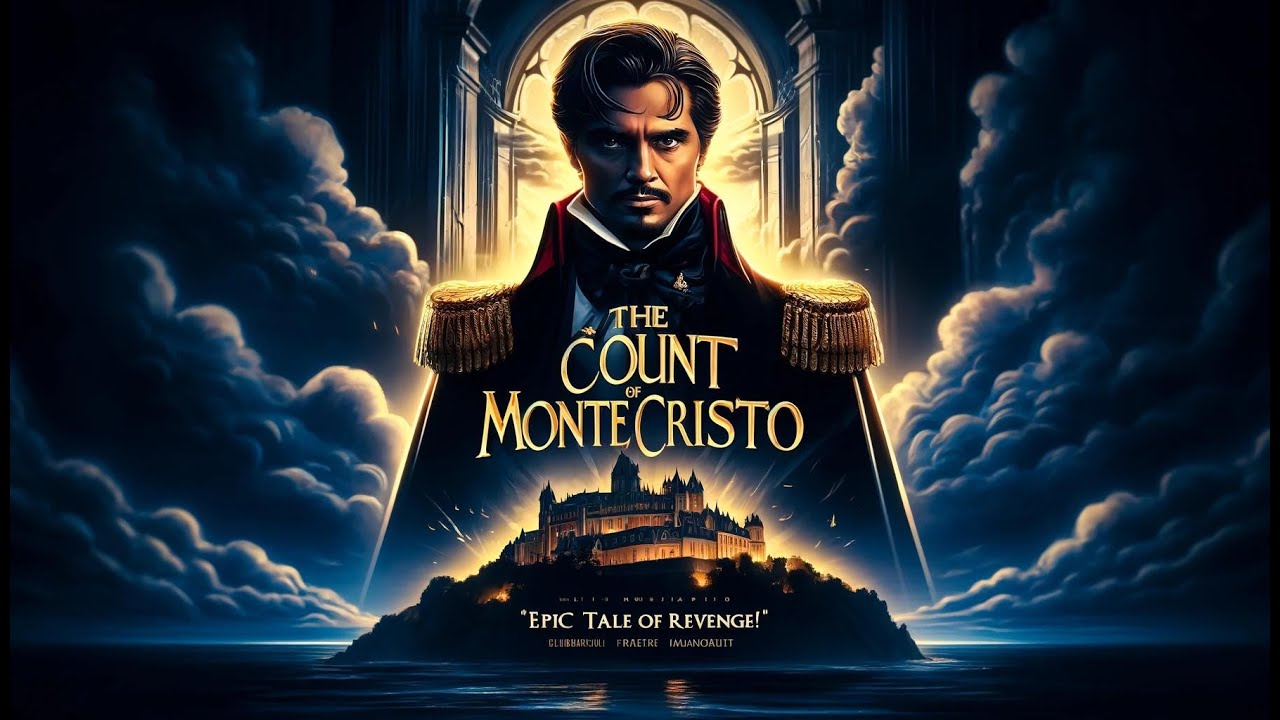Exploring Revenge And Redemption: A Review Of The Count Of Monte Cristo

Table of Contents
The Allure and Pitfalls of Revenge in The Count of Monte Cristo
The Count of Monte Cristo is a masterclass in depicting the seductive nature of revenge. Edmond Dantès, a victim of cruel betrayal and unjust imprisonment, undergoes a profound transformation. His initial innocence and naivete are eroded by years of suffering, fueling a burning desire for retribution. This desire, while understandable given his circumstances, ultimately consumes him, blurring the lines between justice and vengeance.
- Dantès's meticulous planning and execution of his revenge schemes: Dumas meticulously details Dantès's transformation into the Count, showcasing his meticulous planning and calculated execution of his revenge schemes. He uses his newfound wealth and knowledge to systematically dismantle the lives of those who betrayed him, Fernand Mondego, Danglars, and Villefort, employing cunning strategies and manipulating events from the shadows.
- The moral ambiguity of his actions – are they justified?: The novel doesn't offer easy answers. While readers sympathize with Dantès's suffering, his actions raise complex moral questions. Is revenge ever truly justified? Does the end justify the means, even when those means involve considerable pain and suffering inflicted on innocent bystanders? Dumas forces us to confront these questions as we witness the devastating consequences of Dantès's actions.
- The psychological toll revenge takes on Dantès himself: While Dantès initially finds satisfaction in his revenge, the process takes a heavy psychological toll. The constant scheming and manipulation erode his sense of self, leaving him emotionally isolated despite his wealth and power. He becomes consumed by his quest for revenge, ultimately losing sight of his own happiness and well-being.
- Examples from the text illustrating the destructive consequences of revenge for both Dantès and his targets: The downfall of Fernand Mondego, stripped of his honor and wealth, serves as a potent example of the destructive power of revenge. Similarly, Danglars's relentless pursuit of riches leads to his ultimate ruin. Even Dantès himself is deeply affected, suffering from the emotional scars of his actions. The novel highlights that revenge is a double-edged sword, inflicting damage on both the avenger and the avenged.
Exploring Redemption: A Chance for Forgiveness and a New Beginning
Despite the overwhelming focus on revenge, The Count of Monte Cristo is also a powerful story about redemption. Dumas masterfully portrays Dantès's gradual shift from a vengeful mastermind to a man capable of compassion and forgiveness. This transformation is not immediate; it is a gradual process fueled by his evolving relationships and the influence of key figures in his life.
- Instances where Dantès demonstrates mercy or compassion: While Dantès exacts revenge, he isn't entirely consumed by it. There are instances where he shows mercy, particularly towards those who genuinely repent or show remorse for their actions. This gradual softening of his heart is crucial to his eventual redemption.
- His evolving relationships with key characters, demonstrating growth: His relationship with Haydée, a victim of slavery and betrayal, mirrors his own experiences and fosters empathy. Her strength and resilience inspire him to move beyond his obsession with revenge and embrace a more compassionate approach to life.
- The role of love and forgiveness in his redemption: The enduring love for Mercédès, despite her past actions and his own betrayal, plays a pivotal role in his redemption. The possibility of forgiveness, both from himself and others, offers a pathway to a more fulfilling life.
- The impact of Haydée's presence and influence on his journey: Haydée’s own journey of suffering and resilience profoundly affects Dantès. She provides a counterpoint to his vengeful plans, offering him a different perspective and showing the destructive nature of an endless cycle of hatred. Haydée’s presence helps him to understand that genuine happiness lies not in revenge, but in finding peace and forgiveness.
The Enduring Legacy and Relevance of The Count of Monte Cristo
The Count of Monte Cristo's continued popularity is a testament to its timeless themes and captivating narrative. The novel's influence extends far beyond literature, permeating popular culture and inspiring countless adaptations.
- The novel's influence on subsequent adventure stories and revenge narratives: Dumas's masterful storytelling has significantly impacted the genre of adventure literature and revenge narratives, influencing countless subsequent works. The Count's cunning and resourcefulness continue to inspire writers and filmmakers.
- Its enduring appeal to modern readers: The themes of injustice, betrayal, and the search for justice remain highly relevant to modern audiences. The story resonates with readers who feel wronged or have experienced betrayal, offering a powerful exploration of human emotions and the enduring quest for justice.
- Thematic relevance in today's world – themes of injustice, betrayal, and the search for justice: The novel's exploration of societal injustices, political corruption, and the abuse of power remains incredibly relevant in today's world. The themes of betrayal and the flawed justice system are universally understood and continue to resonate with readers.
- Adaptations of the story in film, television, and other media: The Count of Monte Cristo has inspired numerous film, television, and stage adaptations, demonstrating its enduring appeal and adaptability across various media. These adaptations showcase the novel's enduring power to capture the imagination of audiences worldwide.
Conclusion
The Count of Monte Cristo is more than just a thrilling adventure; it's a profound exploration of revenge, its seductive power, and the challenging path to redemption. Edmond Dantès's journey highlights the complex moral questions surrounding revenge and the possibility of finding forgiveness and peace even after suffering great injustice. The novel’s exploration of these timeless themes, coupled with its compelling characters and intricate plot, ensures its enduring legacy as a literary masterpiece.
Have you been captivated by the intricate plot and compelling characters of The Count of Monte Cristo? Share your thoughts on the themes of revenge and redemption in the comments below! Dive deeper into the world of Dumas and explore the enduring legacy of this classic novel – start reading The Count of Monte Cristo today!

Featured Posts
-
 Ufc Des Moines Predictions Who Will Win
May 04, 2025
Ufc Des Moines Predictions Who Will Win
May 04, 2025 -
 Pitch Perfect Stars Recall Unlikely Friendship Beginnings
May 04, 2025
Pitch Perfect Stars Recall Unlikely Friendship Beginnings
May 04, 2025 -
 Finding Information In The Logan County Jail Report A Step By Step Guide
May 04, 2025
Finding Information In The Logan County Jail Report A Step By Step Guide
May 04, 2025 -
 Tioga Downs 2025 What To Expect From The Upcoming Racing Season
May 04, 2025
Tioga Downs 2025 What To Expect From The Upcoming Racing Season
May 04, 2025 -
 Is This Thing On Filming Bradley Cooper Directs Will Arnett In New York City
May 04, 2025
Is This Thing On Filming Bradley Cooper Directs Will Arnett In New York City
May 04, 2025
Latest Posts
-
 Kentucky Derby 2025 Pace Prediction Key Horses And Their Impact
May 05, 2025
Kentucky Derby 2025 Pace Prediction Key Horses And Their Impact
May 05, 2025 -
 The 2025 Kentucky Derby Pace Scenarios And Their Implications
May 05, 2025
The 2025 Kentucky Derby Pace Scenarios And Their Implications
May 05, 2025 -
 Examining The 2025 Kentucky Derby Anticipating The Winning Pace
May 05, 2025
Examining The 2025 Kentucky Derby Anticipating The Winning Pace
May 05, 2025 -
 Kentucky Derby 2025 Factors Influencing The Race Pace
May 05, 2025
Kentucky Derby 2025 Factors Influencing The Race Pace
May 05, 2025 -
 Colonial Downs Stones Big Announcement The Virginia Derby Is Coming
May 05, 2025
Colonial Downs Stones Big Announcement The Virginia Derby Is Coming
May 05, 2025
